Search engine optimization is a highly lucrative way to build a law firm for many practice areas, including Divorce and Family Law. It’s also a very competitive marketing channel. So ranking can be difficult and maintaining rankings requires investment, too. That’s because whenever you show up on the first page for one of your top keywords, you’ve effectively pushed a competitor onto page 2.
In order to succeed in SEO, you need a plan to build an solid foundation and invest in ongoing efforts to benefit from organic rankings.
In this article, we’re going to dive into 7 of our best SEO tips that family law and divorce attorneys can use to dominate the rankings.
Our 7 SEO Tips for Divorce and Family Law Attorneys
- Build Your Law Firm’s Website for Users, Clients & Search Engines
- Build High-Quality, Relevant & Authoritative Backlinks
- Collect More Relevant 5-Star Reviews on Top Sites
- Optimize your Online Profiles & Google My Business
- Create Better Practice Area Pages to Get More Clients
- Build an Information Hub that Makes you the Top Authority in Your Market
- Optimize Site Structure to Make it SEO-Friendly
1. Build Your Law Firm’s Website for Users, Clients & Search Engines
At the heart of your SEO strategy, efforts and investments is your website. This is your primary assets and the entity you want to rank in the search results on Google, Bing and other search engines.
Think of the old mantra “location, location, location”.
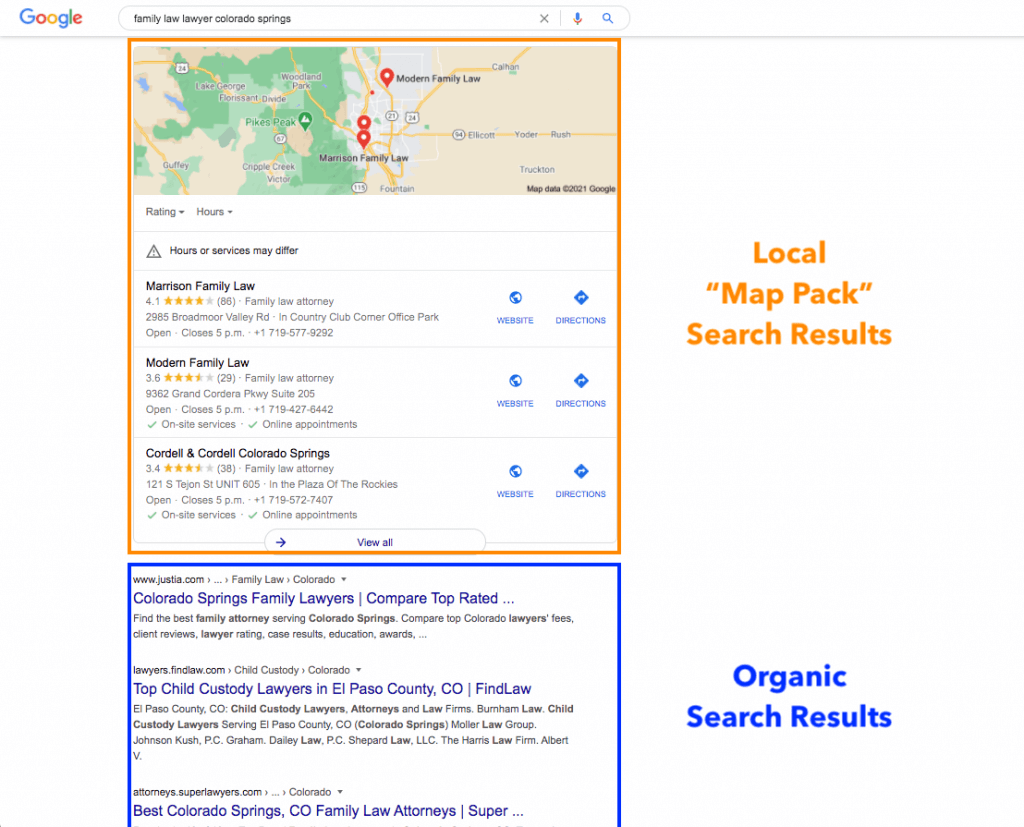
In order to attract more family law clients, you need to get in front of them by owning and controlling the traffic. On google, the top 10 organic positions and 3 local results represent the virtual real estate you want to occupy. Page 1 of Google is the main street of the internet and you want to ensure you have a page occupying one of these coveted positions.
In order to achieve top rankings, every aspect of your website and all its features must be deliberate and focus on providing:
- The best content available
- The best user experience possible
These are among the most important factors of on-site and on-page SEO and will make a significant impact on contributing to your first-page rankings.
Let’s dig into these a little further.
Creating Exceptional Content for Your Visitors
The content you create can fall into one of two categories:
- Content that your target audience is searching for
- Content that they are not searching for
Content that users are searching for is critical to get your site ranking and in almost all cases (with some exceptions) is all that matters for optimizing your website for organic search. Google, bing and other search engines will match keywords and search terms to the content on your website – whether that’s pages, blog posts or informational articles.
Many attorneys are guilty of having websites that are filled with dense language, legal jargon or just unhelpful information that doesn’t tell the user (or search engines) what they do, how they can help or answer their questions in plain language.
Write your content the way you would explain a legal issue or give advice to a client in person; in layman’s terms that are easier to understand and digest.
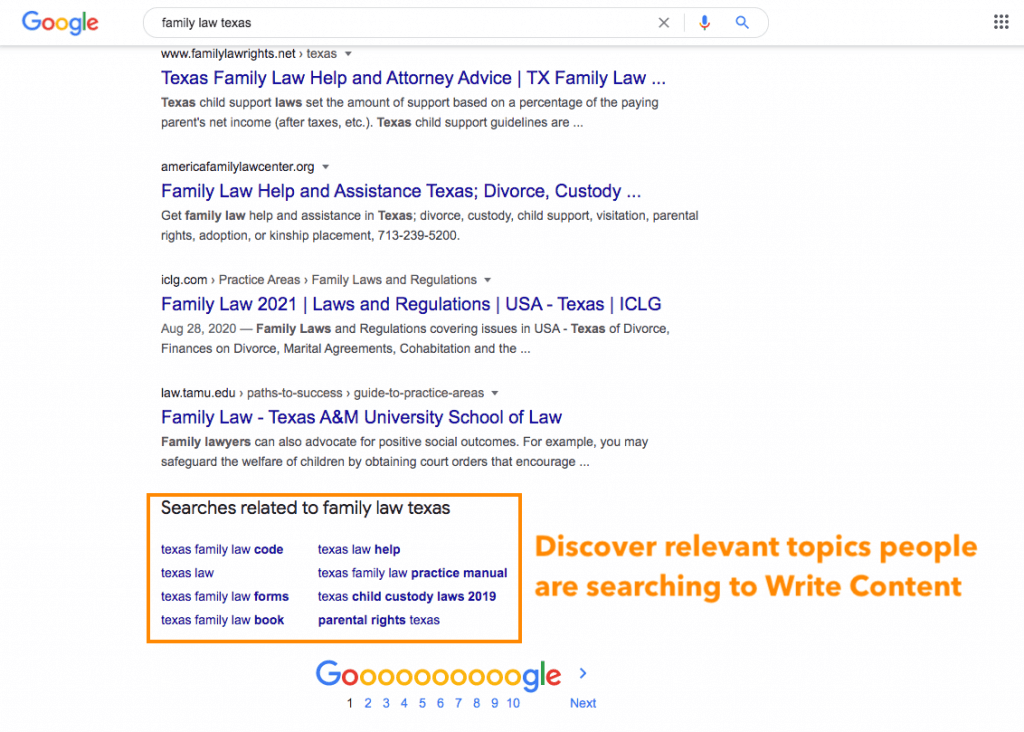
Look at what people are typing into search engines and write useful and thorough information that answers their questions and queries. You can find this just by searching for a topic on divorce or family law you want to write about and looking at the Related searches and People also ask areas on the search results page.
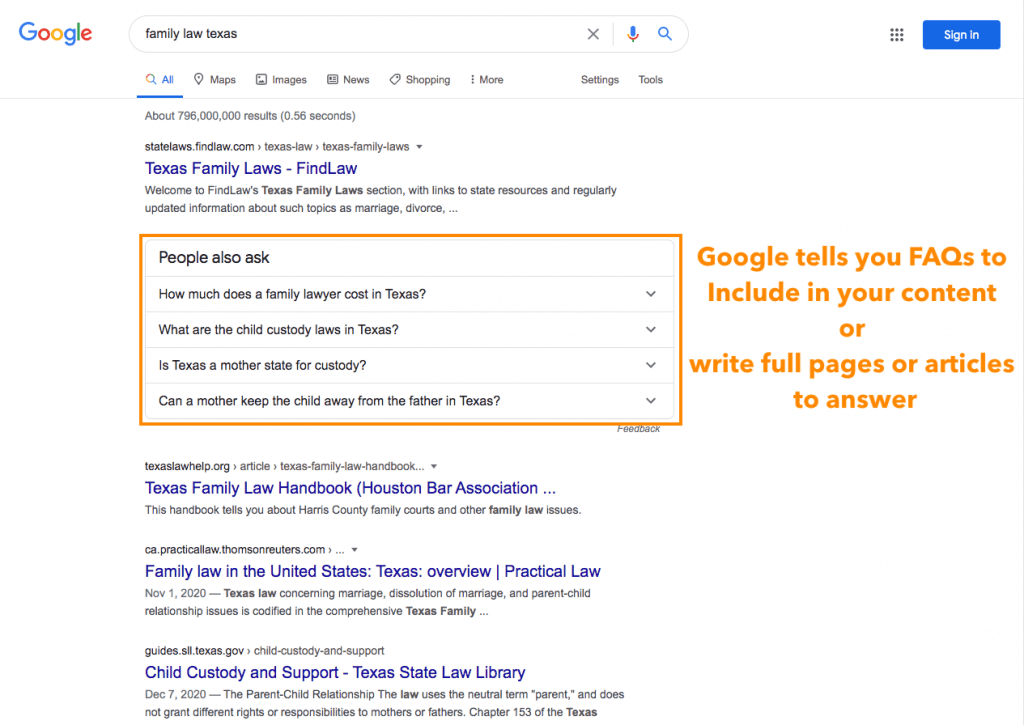
Ensure that the content isn’t long-winded or requires a semester of law school to understand it. The information you provide on your site should provide direct and immediate answers to people’s questions. Whatever tangential information you don’t unpack in your articles and pages are great opportunities to link out to and cite authoritative sources, such as federal or state law websites.
Deliver a Great User Experience
Aside from written content, the User Experience on these pages can be improved by adding:
- Videos
- Custom images
- Table of contents
- Helpful and illustrative examples, graphics and tables
- Relevant sub-navigation and internal linking
- FAQs
Google’s mission is to help provide the best information to users. Part of a website’s purpose isn’t just to deliver that information, but to organize and present it in an easy to understand and meaningful way.
These elements will help users to navigate your website and pages more easily, understand complicated topics (we’re talking about the law after all) with visual aids and examples, go beyond by anticipating their next questions and answering them in the FAQs section. Providing multiple media formats (text and video) for potential clients to digest information in their preferred manner is great for keeping people engaged longer, which is an important ranking signal to optimize for.
2. Build High-Quality, Relevant & Authoritative Backlinks
Backlinks are an essential part of building your website’s authority. So much so that there’s an entire industry of tools dedicated to finding and analyzing backlinks to and from websites as well as estimating how much “authority” they pass from Google’s perspective.
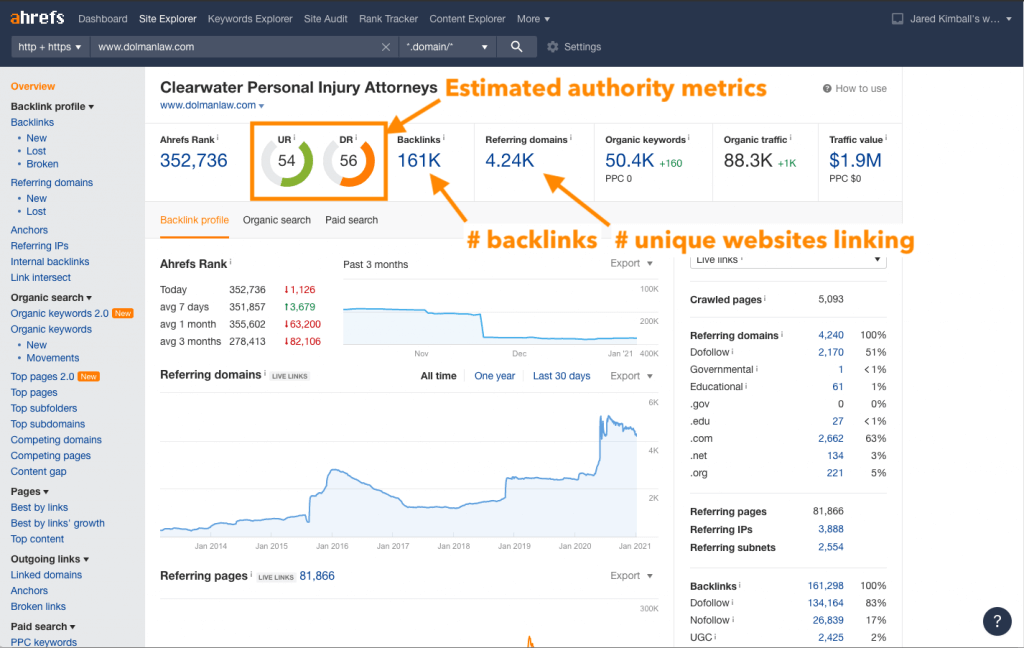
Note: SEO tools that analyze backlinks don’t have a way of knowing for certain what Google thinks of particular links, but they’ve built algorithms that attempt to estimate this and the impact of backlinks and websites.
Building links takes a lot of time, energy and persistence. It’s one of the most time-intensive activities in improving rankings. Not all links are created equal and they’re not a one-size-fits-all. A great link for an animal shelter’s website is not likely going to be very helpful (and could be harmful) for a divorce lawyer’s site.
When it comes to what’s best for your firm’s website, you want to focus on 6 categories of links.
- Topical & Relevant – Either websites or articles that discuss topics that are topically relevant to your area of law. For family law, this could be mom blogs and parenting websites where you contribute a guest post or even provide info from your site which is cited and linked back to.
- Legal – Other legal websites, such as Avvo and Justia as examples or more editorial-type or blog-focused sites like attorneyatwork.com and lawyerist.com. Legal links can pass authority and trust signals, but what they always pass is relevance, from one site topically focused on law to another website (yours) focused on law.
- Local – These are other websites with organizations and businesses based nearby. This includes your chamber of commerce, local non-profits, other local businesses and bloggers in your city.
- Trust – These are websites such as the BBB, chamber of commerce and government websites that will pass trust signals to your site.
- Authority – Links from highly authoritative websites are what will separate you from the competition. There are a lot of different forms of authoritative sites, including medium to large organizations, editorial sites, media sites such as newspapers and local news stations. These are usually the most difficult to acquire, but have a high payoff when done correctly.
- Citations & Directories – These are websites like YellowPages and Yelp. There are many less popular business directories online that will link back to your site. These links aren’t very powerful, but they are good for general visibility of your site as well as leveling the playing field between your firm and competing family law attorneys near you.
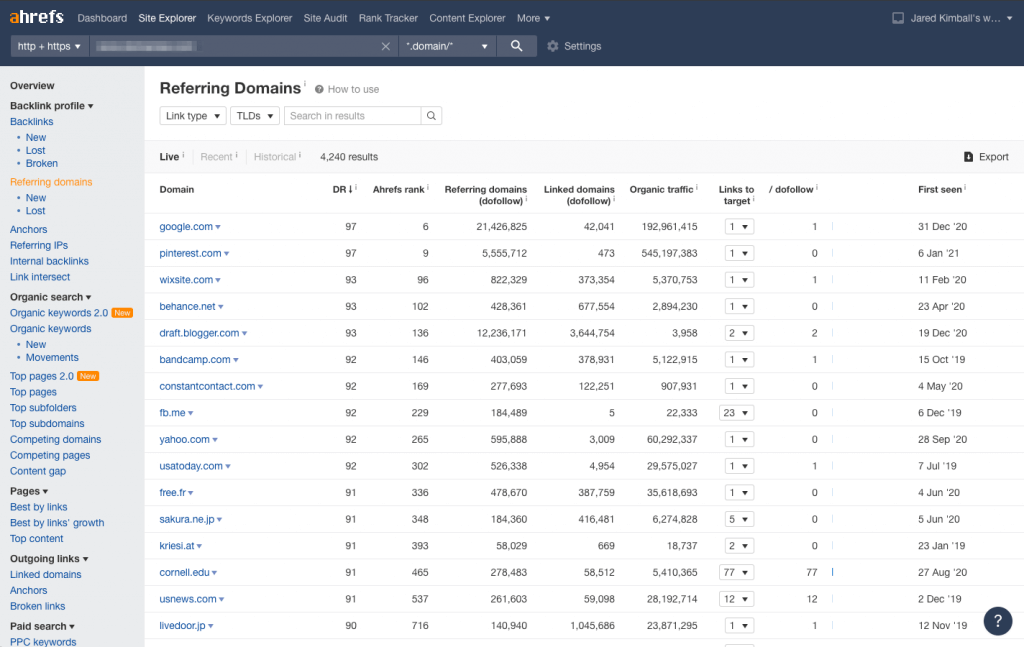
A healthy backlink profile will consist of a mix of all categories listed above. A single link could have constituent parts of several or all categories. You can learn more about link building for lawyers including the what’s, how’s and why’s.
3. Collect More Relevant 5-Star Reviews on Top Sites
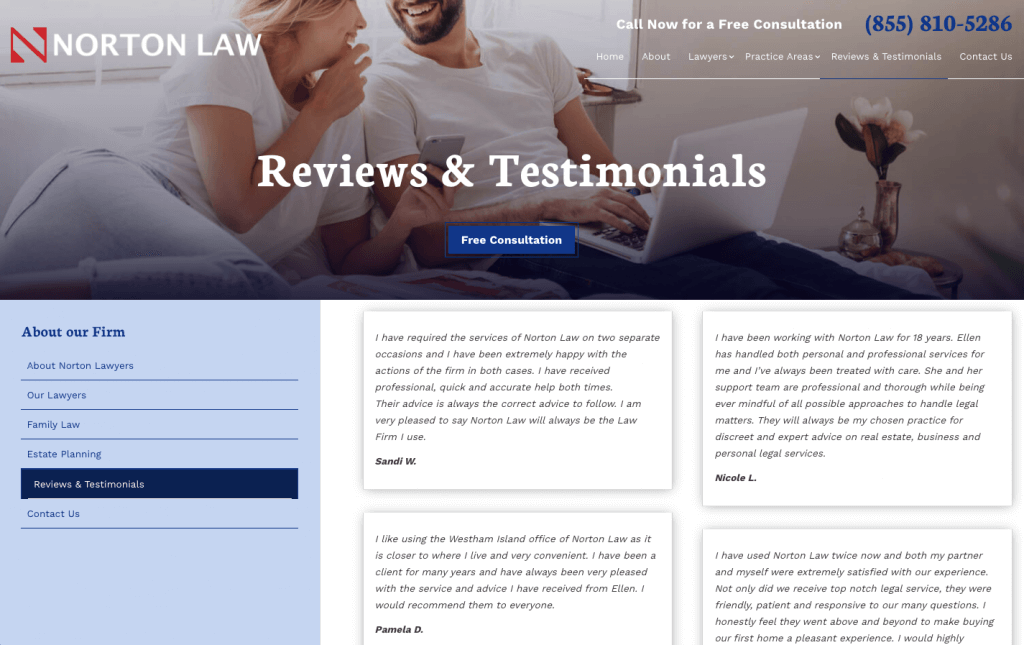
Generating reviews is critical for modern search engine optimization. Reviews are one of the most powerful and simplest ways to develop authority, relevance and trust with potential clients and search engines.
Like links, reviews are an important part of ranking (especially for Local SEO). There are several important factors to be cognizant of when attracting more reviews. Some review sites are more important than others. For attorneys and law firms, this includes:
- Yelp
- Avvo
- Other review sources such as the BBB
If you focus your efforts on these or even the top 3 listed here, then your firm’s online reputation and presence will be in prime shape.
These sites are most important because they are the most viewed by online visitors and highly utilized sources by third-parties. For instance, reviews and ratings on these site are most weighted and evaluated by search engines. Google looks at all of these sources directly, with a primary emphasis on its own Google Reviews.
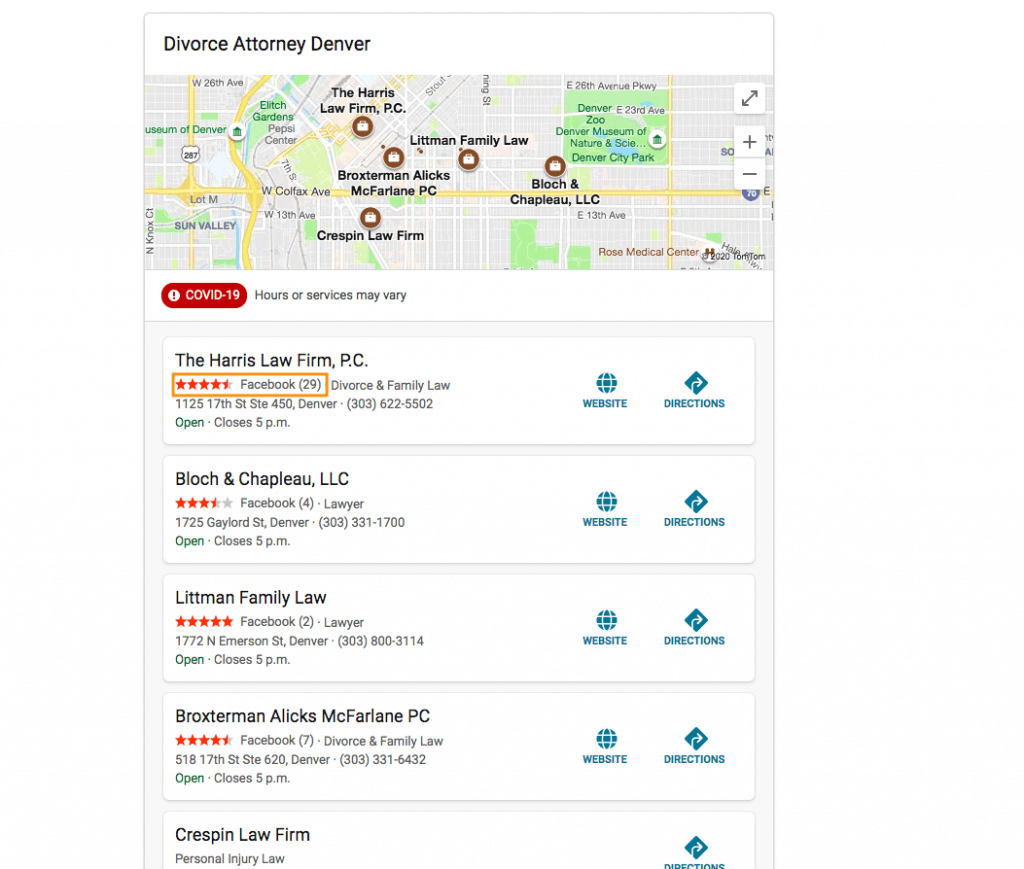
Bing uses Facebook reviews and Apple maps display reviews from Yelp in their listings and use them as part of their own search engine rankings factors.
The second important part to be aware of is the contents of a review. Reviews contain written text along with a numerical, star-rating. The review content itself is used as a ranking signal to google and shows relevance about what your firm did for a particular client.
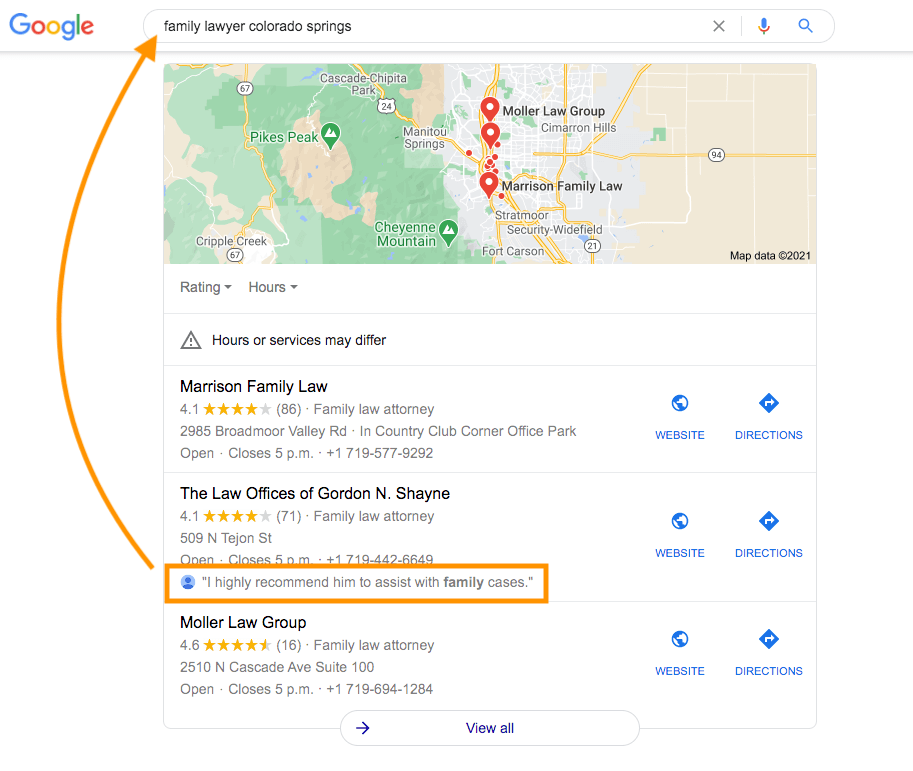
So if a review contains keywords like “divorce” or “family law matters” then it will actually help your rankings. This is an advanced part of the review cultivation process. Once you’ve established a system or process for requesting past and current clients for reviews, you can refine the process to help get more relevant and rich info into these reviews.
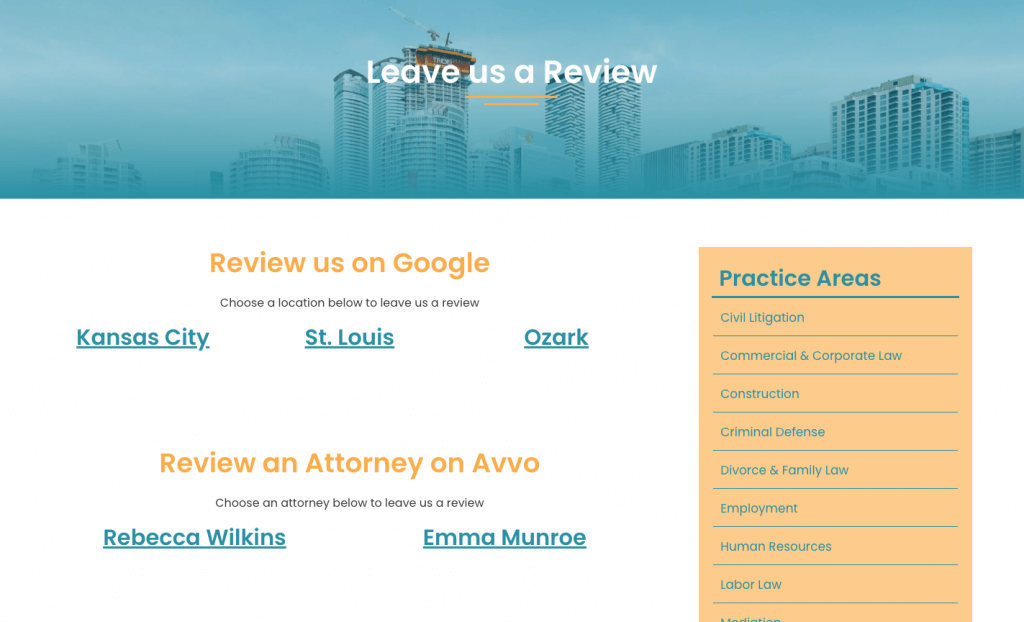
An excellent way to generate more reviews is to have a page on your website dedicated to asking for reviews. This way you can email clients a link to your page where they can find links to different review platforms like Google, Avvo, Facebook and Yelp. This also helps if you have multiple office locations, too.
4. Optimize your Online Profiles & Google My Business
While your website is your primary digital marketing and SEO asset, there are other web properties that you want to retain control of and optimize as thoroughly as possible. This includes your Google My Business profile (also referred to as GMB) as well as your Bing Places, Yelp, Facebook business page and BBB.
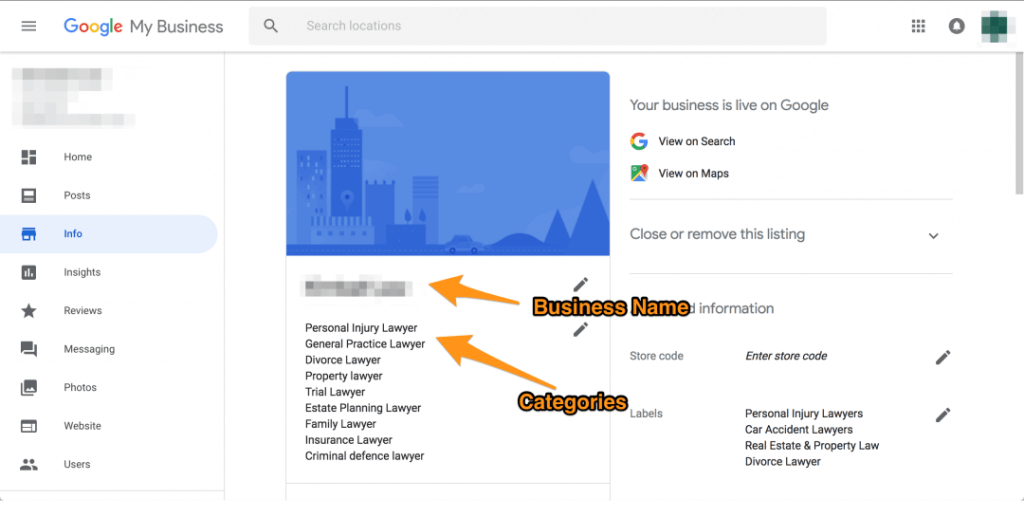
This also relates to the link building discussed earlier. In addition to Bing, GMB, Yelp and others listed above, legal websites like Avvo, Lawyers.com, FindLaw and Justia will allow you to create profiles for attorneys or claim existing ones. The more detail and fields you can complete in each profile, the better optimized they will be.
A critical part of this process is ensuring that your NAP or sometimes called NAP-W (Name, Address, Phone number – Website URL) are all up to date and consistent. Make sure that the spelling and display of these attributes on all of your profiles match exactly what is listed on your website as well as your GMB profile.
Additional important attributes to ensure that match include business categories (i.e. family law lawyer, divorce attorney, etc.), operating hours, images, logos and biographical information, including a business description.
5. Create Better Practice Area Pages to Get More Clients
When it comes to bottom-of-funnel keywords, there’s no better way to drive high-converting traffic into leads and clients than to focus on developing the best home page and practice area pages possible.
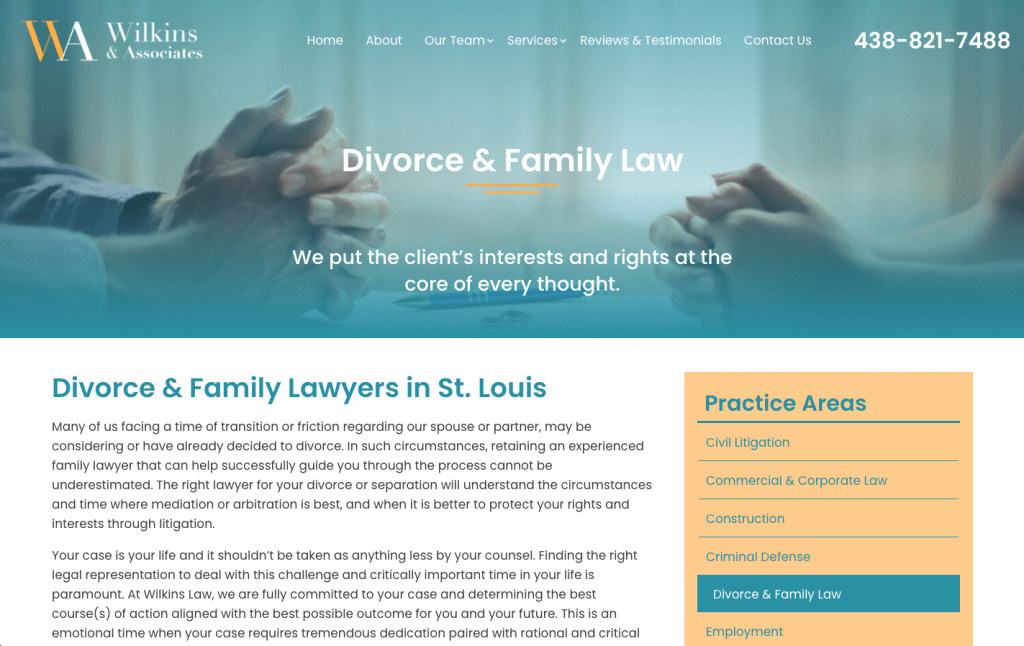
Your practice area pages will typically target high-value, transactional keywords. These keywords earn this categorization as it’s typically what people search for when they’re ready or just about ready to get in contact with an attorney for their divorce or family legal matters.
In order to rank in the top organic positions for these keywords, your firm’s pages need to be better than your competitors’. In short, this means making them longer and more in-depth. While it’s not a rule of thumb, this typically translates into a higher word-count.
The added page length should focus on handling multiple search intents, such as:
- answering questions and concerns
- relevant parts of the law that are common barriers for clients
- what areas you serve
- Introducing related topics commonly conflated
- How your firm and lawyers are equipped to assist clients
- What makes you different and reasons to hire
Aside from written content, the User Experience on these pages can be improved by adding:
- Videos
- Custom images
- Table of contents
- Helpful and illustrative examples, graphics and tables
- Relevant sub-navigation and internal linking
- FAQs
Going the extra mile with your practice pages is what could put your pages in the top search results and keep them there in the long-term.
6. Build an Information Hub that Makes you the Top Authority in Your Market
If becoming an elite, market-leading divorce and family law firm in your city or areas you serve is a priority, then creating an information hub can be a major asset in helping you get there. The more family law clients you want to attract and the larger the geographic area you serve is, the more it will make sense to develop and grow an info library of articles and resources to provide for free online.
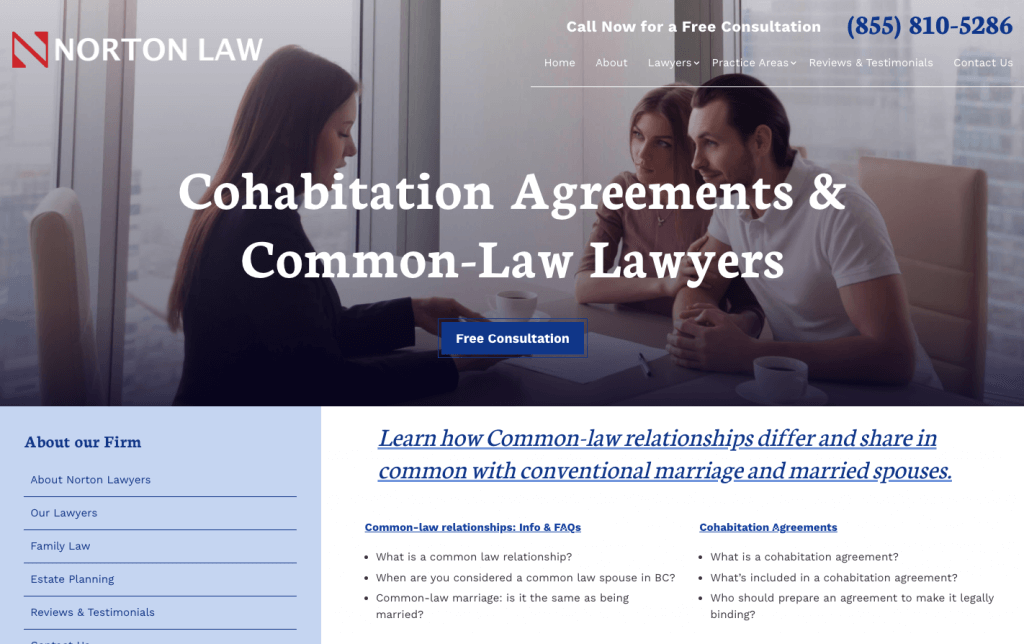
There are few other excellent ways to attract new business than by building an info center or hub on your website. This builds authority not only through your prospective clients’ eyes but also acts as a giant link magnet, providing highly linkable content that will automatically attract new backlinks from all types of editorial and authoritative sources without having to actively build them.
If your law firm serves a large metropolitan area, your state’s capital city or practices state-wide, then there’s likely to be virtually no end to the amount of content you can create over time.
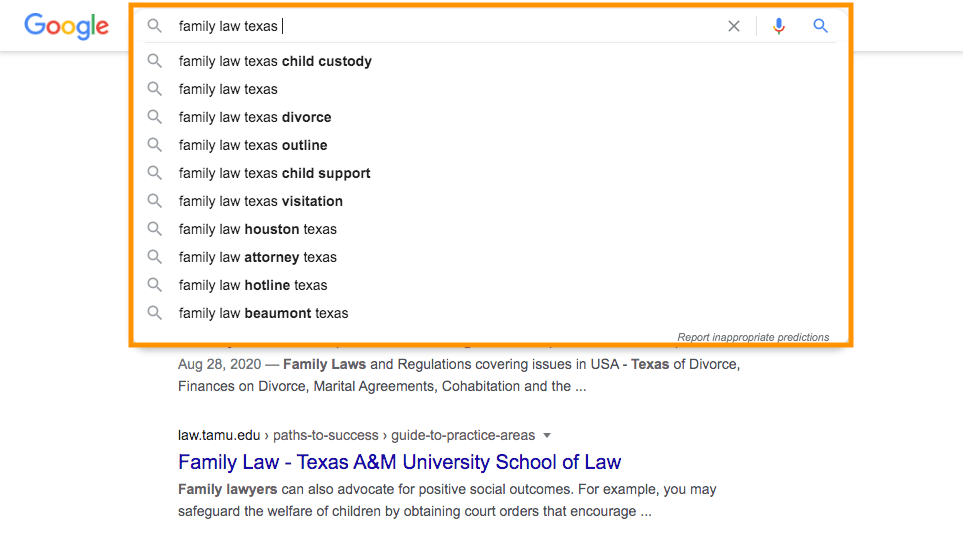
Focus the majority of your content on answering queries and questions targeted to your local market. Most often, this will be content written for state-level queries and keywords. This type of content won’t provide the same conversion rates for generating leads that your home page or main practice area pages do, but have the potential to drive so much more traffic and make up the bulk of your website leads.
7. Optimize Site Structure to Make it SEO-Friendly
Many times an optimized site structure alone can have a profound impact on your search engine rankings. This includes how internal pages are linked together as well as your site’s navigation menus, such as the header, sidebar and footer.
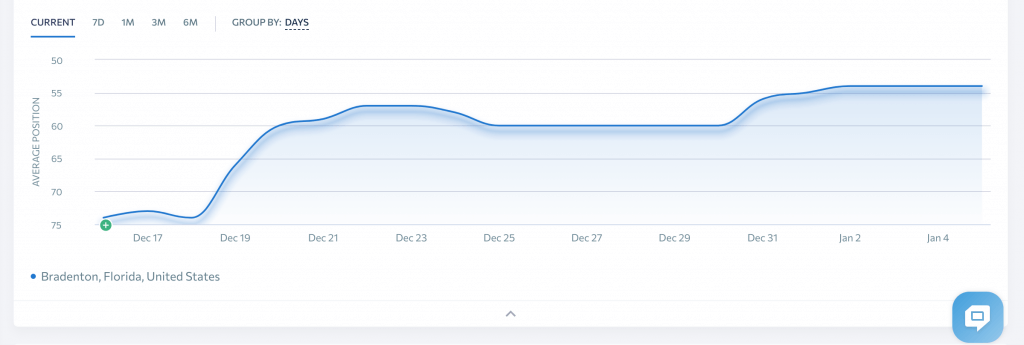
We recently overhauled the structure for one of our client’s sites and saw an immediate increase in their rankings within a matter of weeks from just a structural optimization alone.
Ensure that all top-level pages linked in the main navigation menus are relevant to each other. Additional pages should be linked to through internal pages as well as sub-menus on internal pages to group pages and content together based on relevance.
On the technical SEO side, make sure to fix any outstanding www or non-www URLs as well as redirecting all traffic to secure https links. By auditing and fixing these problems as well as structure and architectural issues, you may see anything from a bump to a major boost in rankings in a short period of time.
Conclusion
Ranking for divorce and family law attorney keywords can be challenging due to the competition for these profitable and highly desired positions in Google and other search engines. With work and by implementing these tips into a cohesive plan for your SEO strategy, you’ll be well on your way to higher rankings and signing up more clients.
Want to Dominate the Organic Page 1 Results in Your Market?
If you’re looking to grow your firm by expanding your online marketing and search presence, then search engine optimization could be the right move for your firm. If you’re interested in finding out if and how we can help you get to and stay on page 1 for the most lucrative keywords for your business, contact us at Zahavian Legal Marketing today. You’ll receive insights into your competition when you do as part of your free consultation.


